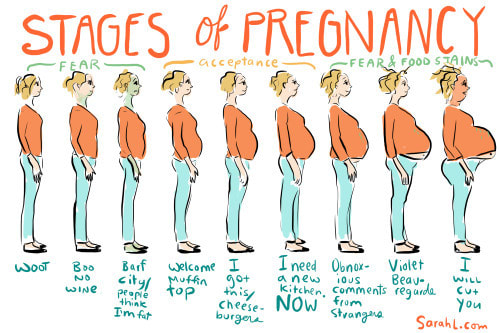TrimesterFirst Trimester
You're actually not pregnant yet—the clock starts ticking from the first day of your last period.
Week 1
Your baby is a tiny ball – called a blastocyst – made up of several hundred cells that are multiplying quickly.
Week 3
Your fertilized egg, known as a zygote, is a ball of 32 cells that's about the size of a poppy seed.
Week 4
Your baby's nose, mouth, and ears are beginning to take shape. You may be having morning sickness and spotting.
Week 6
As your pregnancy hormones increase, morning sickness may be worsening. Or, you may be ravenous 24/7.
Week 7
His delicate facial features are becoming more refined, with his ears, upper lip, and the teeny tip of his nose all clearly visible.
Week 8
Reproductive organs are beginning to form now, along with some other key organs, like the pancreas and gallbladder.
Week 9
You may have aches and pains in your abdomen, as baby's putting a pressure on your organs, veins, muscles and ligaments.
Week 10
The fetus will start to inhale and exhale small amounts of amniotic fluid, which helps your baby's lungs to grow and develop.
Week 11
Fingernails, toenails, and bones are forming, and a fine layer of hair covers most of her body.
Week 12
When you put your hand on your belly, your baby will likely wiggle in response because his reflexes are starting to develop
He'll also start to open and close his fingers, curl his toes, and jerk and kick his arms and legs
Week 12
Your beautiful baby is the size of a Meyer lemon this week—and his vocal cords are beginning to develop.
Week 13
Baby's intestines are moving from the umbilical cord to their more permanent place, in the tummy.
Week 13
TrimesterSecond Trimester
The roof of your baby's tiny mouth is fully formed now, and her constant sucking reflexes are helping to create full, cherubic cheeks
Week 14
If you're having a boy, the prostate is forming, and if you're having a girl, her ovaries are moving down into her pelvis.
Week 14

























